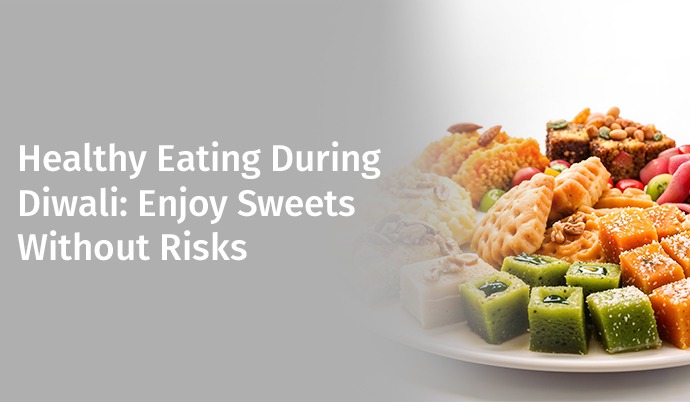
For this wide segment of the population, and for anyone who cares about their health, festive times can often seem like a minefield of high-sugar sweet treats and deep-fried snacks.
But just because you’re eating healthier during a festive period doesn’t mean you have to miss out on any of the fun. Instead of deprivation, healthier eating is about moderation and choosing wiser options. This guide, put together with our expert opinion, is created for you and your family to enjoy the Diwali celebration for what it is; a great celebration with plenty of fun and options while reducing the health challenges associated with the consumption of sweet treats and heavy snacks. Also, a special emphasis is given to help those suffering from diabetes by preparing healthy and delicious sweets.
Key Takeaways
Why the Festive Season Challenges Our Health
Knowing the "why" leads us to improve the "how." The common hurdles during the Diwali period are:
Our aim is not to battle the challenges with strict rules, but rather to navigate through them with intention.
Smart Strategies for Navigating the Festive Spread
Your game plan for healthy eating during festivals starts before you even reach for the plate.
1. Before the Party: The Power of Preparation
2. At the Snack Table: Choose Your Savouries Wisely
The variety of fried food might be hard to resist, but there are often healthier alternatives!
3. The Sweet Spot
This is the ultimate Diwali challenge. The key is mindful indulgence.
Guide to Delicious, Diabetes-Friendly Sweets
Making your own sweets is the best way to ensure they are healthy. This is where the magic of creating truly diabetes-friendly sweets happens.
1. Ditch the Refined Sugar
Refined white sugar is the major offender when it comes to conventional sweets. Replace it with all-natural substitutes that are lower on the glycemic index and have the added benefits of nutrition.
2. Power Up with Nuts, Seeds, and Fiber
The healthiest fats and fiber can be your best friends with desserts that work well for diabetic diets since they slow the absorption of sugar into the bloodstream and avoid a high spike.
3. A Simple, Healthy Recipe Idea: No-Sugar Date and Nut Ladoos
Health Habits to follow this Diwali
Expert Guidance for a Healthy Festive Season at SGRH
Managing your health at festive times such as Diwali can be stressful, especially if you have diabetes, hypertension, or heart disease. A customized plan can significantly help you manage your condition. The Department of Dietetics & Nutrition works closely with the Department of Endocrinology & Metabolism at Sir Ganga Ram Hospital to provide thorough advice and support.
Our team of expert dietitians and endocrinologists will help you create a personalized festive eating plan, provide useful hints for managing your condition, and share ideas to enjoy Diwali and its festivities without negatively altering your health.
For an individualized assessment on how to celebrate and enjoy the festive period while managing your health, [book an appointment today with our team of specialists.]
Frequently Asked Questions (FAQs)
Q1: Is it okay to eat ready-made "sugar-free" sweets?
Be careful! These sweets may include little to no refined sugar, but they are often filled with unhealthy fats, refined flour, and artificial sweetener. These can affect your health as well as your blood sugar. There is a very high likelihood that homemade sweets are safer and healthier.
Q2: Can I still use artificial sweeteners, such as aspartame in my homemade sweets?
They can be a way to reduce sugar, but it is far easier to use natural sweeteners such as dates and fruits, which have added fiber and nutrients. If you do use artificial sweeteners, do so in small doses.
Q3: What is the safest alcoholic drink to choose during a Diwali Party when I have diabetes?
It is generally not a good idea to drink alcohol. If you do choose to drink, try to choose dry wine and/or a spirit with a zero-calorie sparkling or diet soda as a mixer. Avoid drinking cocktails, sweet wines, or beer since they will contain a lot of sugar and/or carbohydrates. When drinking, always do so moderately and/ or with food.
Q4: What are some healthy and thoughtful Diwali gift ideas instead of traditional mithai? Gifting health is a wonderful gesture. Instead of a box of sweets, consider a beautifully arranged basket of fresh, seasonal fruits, a premium selection of unsalted nuts and seeds (like almonds, walnuts, and pistachios), a collection of exotic green teas, or a jar of high-quality, organic honey. These gifts are just as festive and show you truly care about the recipient's well-being.
Q5: After a few days of festive indulgence, is it a good idea to do a "detox"? While it's tempting to try a 'detox' diet, the best approach is to gently guide your body back to its normal routine. Your body has its own excellent detoxification system (your liver and kidneys). Instead of restrictive juice fasts, focus on rehydrating with plenty of water, eating light, fiber-rich meals (like khichdi or vegetable soups), and resuming your regular exercise. A gentle return to balance is much more effective and sustainable than a drastic detox.


.webp)

